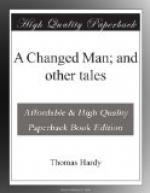The schoolmistress assured her landlady that she could return the sentiment. ‘But here comes my perplexity,’ she said. ’I don’t like keeping school. Ah, you are surprised—you didn’t suspect it. That’s because I’ve concealed my feeling. Well, I simply hate school. I don’t care for children—they are unpleasant, troublesome little things, whom nothing would delight so much as to hear that you had fallen down dead. Yet I would even put up with them if it was not for the inspector. For three months before his visit I didn’t sleep soundly. And the Committee of Council are always changing the Code, so that you don’t know what to teach, and what to leave untaught. I think father and mother are right. They say I shall never excel as a schoolmistress if I dislike the work so, and that therefore I ought to get settled by marrying Mr. Heddegan. Between us two, I like him better than school; but I don’t like him quite so much as to wish to marry him.’
These conversations, once begun, were continued from day to day; till at length the young girl’s elderly friend and landlady threw in her opinion on the side of Miss Trewthen’s parents. All things considered, she declared, the uncertainty of the school, the labour, Baptista’s natural dislike for teaching, it would be as well to take what fate offered, and make the best of matters by wedding her father’s old neighbour and prosperous friend.
The Easter holidays came round, and Baptista went to spend them as usual in her native isle, going by train into Off-Wessex and crossing by packet from Pen-zephyr. When she returned in the middle of April her face wore a more settled aspect.
‘Well?’ said the expectant Mrs. Wace.
‘I have agreed to have him as my husband,’ said Baptista, in an off-hand way. ’Heaven knows if it will be for the best or not. But I have agreed to do it, and so the matter is settled.’
Mrs. Wace commended her; but Baptista did not care to dwell on the subject; so that allusion to it was very infrequent between them. Nevertheless, among other things, she repeated to the widow from time to time in monosyllabic remarks that the wedding was really impending; that it was arranged for the summer, and that she had given notice of leaving the school at the August holidays. Later on she announced more specifically that her marriage was to take place immediately after her return home at the beginning of the month aforesaid.
She now corresponded regularly with Mr. Heddegan. Her letters from him were seen, at least on the outside, and in part within, by Mrs. Wace. Had she read more of their interiors than the occasional sentences shown her by Baptista she would have perceived that the scratchy, rusty handwriting of Miss Trewthen’s betrothed conveyed little more matter than details of their future housekeeping, and his preparations for the same, with innumerable ‘my dears’ sprinkled in disconnectedly, to show the depth of his affection without the inconveniences of syntax.




